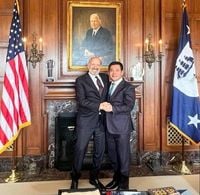After four days of intensive talks in Washington D.C., the third round of bilateral reciprocal trade agreement negotiations between Vietnam and the United States wrapped up on June 12, 2025, marking a significant milestone in the evolving economic relationship between the two nations. The negotiations, which took place from June 9 to June 12, were led by Vietnam’s Minister of Industry and Trade, Nguyen Hong Dien, alongside representatives from various Vietnamese ministries and sectors. On the American side, the delegation was headed by Secretary of Commerce Howard Lutnick and Ambassador Jamieson Greer, the U.S. Trade Representative.
This round of negotiations showcased notable progress, with both parties narrowing gaps across all areas under discussion. According to reports from Kinh tế Việt Nam and other Vietnamese sources, the talks were characterized by frank, detailed exchanges conducted in a spirit of cooperation. The Vietnamese side had previously submitted a response document outlining their positions, which served as a foundation for the discussions. Both delegations took time to listen carefully to analyses and explanations, aiming to find mutually acceptable solutions to outstanding issues.
One of the most groundbreaking moments of this round came on the afternoon of the final day, when the U.S. delegation proposed, for the first time in the bilateral negotiation history, a ministerial-level session featuring the simultaneous presence of Secretary Lutnick and Ambassador Greer. This innovative approach underscored the increasing importance the United States places on its trade relations with Vietnam and demonstrated a willingness to engage at the highest levels.
During this special ministerial session, Minister Nguyen Hong Dien presented several initiatives designed to accelerate the negotiation process and produce tangible outcomes. The U.S. ministers expressed strong appreciation for Vietnam's goodwill and efforts, recognizing these proposals as a critical foundation for ongoing discussions. Secretary Lutnick and Ambassador Greer acknowledged the potential of these initiatives to steer the talks toward an agreement that reflects the interests and expectations of both countries.
Following the plenary session, a private dialogue between Minister Nguyen Hong Dien and Secretary Lutnick further clarified key points. Secretary Lutnick emphasized the value the U.S. places on its relationship with Vietnam and reiterated America's commitment to supporting Vietnam's robust development. He also affirmed that he would coordinate with the U.S. Trade Representative’s office to determine suitable ways to address Vietnam's concerns and proposals.
Minister Nguyen Hong Dien, in turn, expressed gratitude for the U.S. delegation's cooperative stance and reaffirmed Vietnam's determination to cultivate a balanced, sustainable economic and trade partnership. He highlighted the goal of fostering benefits that reach both the Vietnamese and American peoples as well as businesses.
Both sides agreed to maintain momentum by instructing their technical teams to continue active exchanges via online meetings. These virtual sessions will focus on resolving remaining issues and preparing for future negotiations, with the aim of reaching a substantive agreement in the near future that aligns with the conditions and ambitions of each nation.
The successful conclusion of this third round reflects a broader context of Vietnam’s ongoing economic and diplomatic initiatives. On June 15, 2025, Hanoi hosted the launch ceremony of the "National Green Environment" program and the "National Green ESG Enterprises" initiative, signaling Vietnam's commitment to sustainable development and environmental responsibility. Meanwhile, the Ministry of Agriculture and Environment has been spearheading efforts to refine decentralization mechanisms and clarify authority across government levels, further supporting the country’s modernization goals.
Vietnam is also making strides in international cooperation, having recently become a Partner Country of the BRICS group, a coalition of emerging economies. This move aims to amplify the voice and influence of developing nations on the global stage.
Domestically, challenges persist. Reports from Ho Chi Minh City reveal that many small businesses have unexpectedly closed or suspended operations, raising questions about the economic pressures faced by entrepreneurs in major urban centers. Concurrently, significant infrastructure developments are underway, such as the groundbreaking ceremonies for two aviation service projects at Long Thanh Airport, organized by Vietnam Airlines and its affiliates, which promise to bolster the country's connectivity and economic growth.
In administrative developments, Major General Truong Son Lam, former Director of the Ben Tre Provincial Police, was appointed Chairman of the Board of Members of MobiFone, one of Vietnam's largest telecommunications companies, signaling a strategic shift in leadership within the sector.
Vietnam's Prime Minister Pham Minh Chinh has emphasized that recent months have seen the implementation of historic policies and tasks, underscoring the government's commitment to transformative progress across various domains.
Against this backdrop, the trade negotiations with the United States take on even greater significance. The bilateral reciprocal trade agreement is poised to become a cornerstone of Vietnam's economic engagement with one of its most important partners. The fact that the U.S. proposed a ministerial-level negotiation session reflects the deepening importance of this relationship.
Observers note that the goodwill and constructive spirit displayed during the talks bode well for the future. The Vietnamese delegation's proactive stance, including the presentation of innovative proposals by Minister Nguyen Hong Dien, has been met with positive reception, suggesting that both sides are serious about crafting an agreement that is balanced and sustainable.
As the technical teams continue their work, anticipation builds around the potential impact of the trade agreement. For Vietnam, such a deal could mean expanded market access, increased foreign investment, and enhanced economic resilience. For the United States, it represents an opportunity to strengthen ties with a dynamic Southeast Asian economy amid shifting global trade patterns.
Ultimately, the third round of negotiations not only narrowed gaps but also laid the groundwork for a more strategic and cooperative partnership. With ongoing dialogue and mutual commitment, both countries appear poised to navigate the complexities of trade diplomacy and deliver outcomes that benefit their economies and peoples alike.




